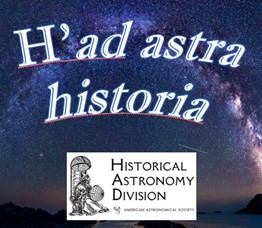Podcaster: Loretta Cannon for the AAS-HAD ; Guest: Dr. Sethanne Howard

Title: H’ad astra historia Episode 101: Women in Science History
Organization: Historical Astronomy Division, American Astronomical Society
Link: https://had.aas.org/
Description:
H’ad astra historia is the official podcast for the Historical Astronomy Division of the American Astronomical Society. We’re here to share stories from and about the people who study the stars, planets, and the cosmos. We’ll be hearing from individuals who not only study the history of astronomy, but also those who lived it, who were “in the room” during pivotal events within the last 50 years or so.
Today’s guest: Dr. Sethanne Howard talks about Women in Science History, including En’Hedu’anna – the first astronomer whose name and work we know – who lived 4,000 years ago in Mesopotamia.
Podcast music: “Frost Waltz” Kevin MacLeod (incompetech.com), licensed under creative commons: by attribution 4.0 license (http://creativecommons.org/licenses/by/4.0/)
Bio:Loretta Cannon, an AAS affiliate via Rose City Astronomers, is a member of the leadership committee for the Historical Astronomy Division (2023-2025). She is a polymath with degrees in anthropology, microbiology, and biochemistry, and has many years of experience in both the private sector and government. When not reading some of her way-too-many books, she watches BritBox, creates recipes, or plays in the garden. She chose science writing/editing in astronomy as a new career. In short, she’s a sciencephile-word-nerd-foodie-with-a-plant-habit who really likes the stars.
Today’s sponsor: Big thanks to our Patreon supporters this month: Paul M. Sutter, Chris Nealen, Frank Frankovic, Frank Tippin, Jako Danar, Michael Freedman, Nik Whitehead, Rani Bush, Ron Diehl, Steven Emert, Brett Duane, Don Swartwout, Vladimir Bogdanov, Steven Kluth, Steve Nerlich, Phyllis Foster, Michael W, James K Wood, Katrina Ince, Cherry Wood.
Please consider sponsoring a day or two. Just click on the “Donate” button on the lower left side of this webpage, or contact us at signup@365daysofastronomy.org.
Please visit our Patreon page: https://www.patreon.com/365DaysOfAstronomy
or you can consider to sponsor a day of our podcast : https://cosmoquest.org/x/365daysofastronomy/product/sponsor-an-episode-of-365-days-of-astronomy/
Transcript:
Rather than provide a complete transcript, we’re sharing links for further reading for the topics or names you’ve heard in today’s episode: “Women in Science History”
Whirlpool galaxy (M51): https://science.nasa.gov/mission/hubble/science/explore-the-night-sky/hubble-messier-catalog/messier-51/
Dr. Sethanne Howard’s PhD dissertation (on ADS): https://ui.adsabs.harvard.edu/abs/1989PhDT……..12H/abstract
Dr. Howard’s website: www.4kyws.ua.edu
Hertzsprung-Russell diagram: https://en.wikipedia.org/wiki/Hertzsprung%E2%80%93Russell_diagram
US Nautical Almanac Office publications: https://aa.usno.navy.mil/publications/almanacs
First writing – Cuneiform in Sumer 3000 BCE: https://en.wikipedia.org/wiki/Cuneiform
En’Hedu’ana, Astronomer-Priestess: https://www.4kyws.ua.edu/EN.html and https://www.bbc.com/culture/article/20221025-enheduanna-the-worlds-first-named-author
Princess, Priestess, Poet The Sumerian Temple Hymns of Enheduanna by Betty De Shong Meador: https://utpress.utexas.edu/9780292723535/princess-priestess-poet/
Aganice of Egypt: https://www.researchgate.net/publication/315014672_Aganice_XX_bc#:~:text=Aganice%2C%20cited%20in%20other%20texts,on%20astronomy%20and%20natural%20philosophy
Theano of Croton: https://en.wikipedia.org/wiki/Theano_(philosopher)
Golden Ratio a+b/a = a/b: https://en.wikipedia.org/wiki/Golden_ratio
Hypatia: https://www.4kyws.ua.edu/HYPATIA.html and https://www.smithsonianmag.com/history/hypatia-ancient-alexandrias-great-female-scholar-10942888/
Library of Alexandria: https://en.wikipedia.org/wiki/Library_of_Alexandria
astrolabe: https://en.wikipedia.org/wiki/Astrolabe
Carl Sagan’s COSMOS: https://en.wikipedia.org/wiki/Cosmos:_A_Personal_Voyage
Arizona Senator Barry Goldwater: https://en.wikipedia.org/wiki/Barry_Goldwater
COBE – Cosmic Background Explorer spacecraft: https://science.nasa.gov/mission/cobe/
1994 AAS announcement of recent COBE results – black body curve (if this isn’t the correct citation, the fault is entirely mine – ljc): https://ui.adsabs.harvard.edu/abs/1994AAS…185.5711S/abstract and https://articles.adsabs.harvard.edu/pdf/1994ApJ…436..423B
blackbody radiation: https://www.e-education.psu.edu/astro801/content/l3_p5.html#:~:text=The%20peak%20of%20the%20blackbody,temperature%20of%20approximately%205800%20Kelvin
Fritz Zwicky; https://www.nature.com/articles/d41586-019-02603-7
Fritz Zwicky reported existence of ‘dunkle kalte materie, 1933: https://adsabs.harvard.edu/full/1999ApJ…525C.297O
Vera Rubin and Kent Ford – flat galaxy rotation curves: https://ned.ipac.caltech.edu/level5/Sept16/Bertone/Bertone4.html#:~:text=In%20the%201960s%2C%20Kent%20Ford,forward%20in%20terms%20of%20quality and https://www.aps.org/publications/apsnews/202306/history.cfm
Gaia space telescope: https://science.nasa.gov/mission/gaia/
Plank mission: https://www.esa.int/Enabling_Support/Operations/Planck
Cosmic Microwave Background: https://www.cfa.harvard.edu/research/topic/cosmic-microwave-background
International Ultraviolet Explorer: https://science.nasa.gov/mission/iue/
Gemini telescopes: https://www.gemini.edu/about and https://astrobiology.nasa.gov/missions/gemini-north-and-gemini-south/#:~:text=The%20Gemini%20Observatory%20consists%20of,most%20advanced%20optical%2Finfrared%20telescopes
Compton Gamma Ray Observatory: https://heasarc.gsfc.nasa.gov/docs/cgro/cgro.html and https://astrobiology.nasa.gov/missions/cgro/
Very Large Telescope (VLT):https://www.eso.org/public/teles-instr/paranal-observatory/vlt/
Orion nebula: https://science.nasa.gov/mission/hubble/science/explore-the-night-sky/hubble-messier-catalog/messier-42/ and an article about Sethanne Howard’s work by Joan Schmelz on the AAS’ website for Women in Astronomy in which Sethanne relates working at Lick Observatory in the 1960s https://womeninastronomy.blogspot.com/2013/06/two-years-at-lick-observatory.html
365 Days of Astronomy
=====================
The 365 Days of Astronomy Podcast is produced by Planetary Science Institute. Audio post-production by Richard Drumm. Bandwidth donated by libsyn.com and wizzard media. You may reproduce and distribute this audio for non-commercial purposes.
This show is made possible thanks to the generous donations of people like you! Please consider supporting to our show on Patreon.com/365DaysofAstronomy and get access to bonus content.
After 10 years, the 365 Days of Astronomy podcast is entering its second decade of sharing important milestone in space exploration and astronomy discoveries. Join us and share your story. Until tomorrow! Goodbye!

